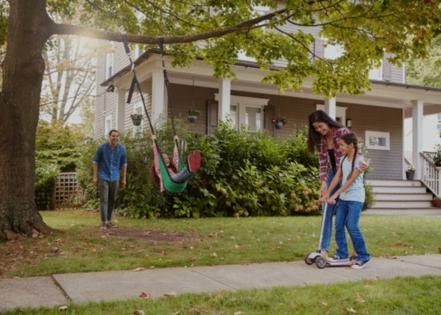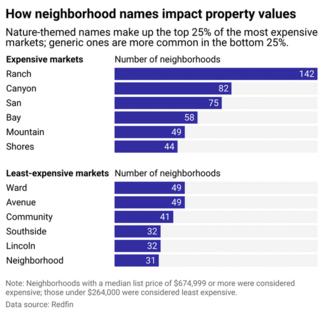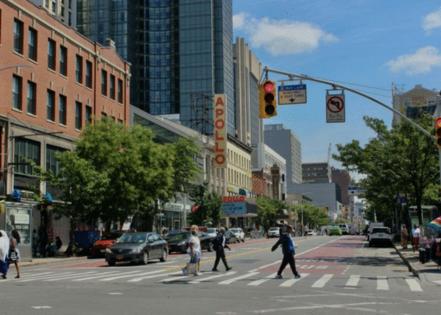Does your neighborhood sound expensive? Here's how names impact real estate prices.
Published in Slideshow World
Subscribe
Does your neighborhood sound expensive? Here's how names impact real estate prices.
In 2012, real estate agents in Oakland, California, began listing houses under a new neighborhood called "NOBE." The acronym—a conjunction meant to represent the North Oakland, South Berkeley, and East Emeryville neighborhoods—quickly spread online, irking its residents. A marketing tool to attract affluent homebuyers and renters, NOBE signaled to many the start of gentrification, a blatant attempt to gloss over the area's history and make it more appealing to newcomers with greater financial resources.
It didn't take long to see the name's economic impact. According to data ZipRealty provided to the East Bay Express, the median home price in Emeryville jumped 37% a year later. In comparison, a nearby ZIP code encompassing parts of North Oakland saw median sale prices vault 59%. More than a decade later, a once-blighted neighborhood is "undergoing a renaissance with new businesses, neighborhood activities, arts, and cultural events every day," according to real estate sites. Despite pleas from vocal critics, the term has now become part of the city's vocabulary, transforming the legacy and nature of the area.
Oakland residents are by no means the first to discover the power—and peril—behind a few letters. Throughout history, name changes within cities have occurred for various reasons: marketing and rebranding campaigns, cultural shifts, and gentrification. The ultimate goal is to shift perception and raise economic value. In 1978, residents living between the Brooklyn Bridge and Manhattan Bridge renamed their enclave "DUMBO" (Down Under the Manhattan Bridge Overpass) and watched development blossom. Two decades ago, a Minneapolis neighborhood association turned a neglected warehouse district into "The North Loop" and eventually one of "America's best hipster neighborhoods," as Forbes described.
"Neighborhood renaming is often spurred by residents and developers who believe a rebrand will increase property values," Dave Fagundes, a professor at Emory University School of Law, told Stacker. "But these attempts often come at the cost of diminishing or even erasing the identities of preexisting neighborhoods."
To explore the complexities and intricacies of neighborhood names, Spokeo examined Redfin data and other sources to see how a few well-chosen words can influence property values.
Visit thestacker.com for similar lists and stories.
What the most and least expensive places have in common
These days, you can't walk around a major city without entering an acronymized neighborhood. Like Oakland's NOBE, Seattle has SoDo, and Miami has SoBe. There's LoDo in Denver, SoWa in Boston, and NuLu in Louisville, Kentucky—and as for New York City, there are too many to count. Still, plenty of other rebrands and renaming conventions have impacted the perception of urban districts, neighborhoods, and even the streets inside them.
In 2015, Zillow surveyed how property values correspond to the street names they're on. As summarized by Business Insider, street names can determine "whether a neighborhood is old or new, rural or downtown and, often, expensive or cheap." It found that, outside of a few cities, on average, homes on named streets are 2% more valuable than those on numbered streets. Additionally, thanks to an analysis of Census Bureau data by Cinch, addresses that "evoked the beach or bodies of water also had high price tags." The average home price for streets with words like "Bayshore," "Island," and "Ocean" were usually priced around $2 million, $1.9 million, and $1.7 million, respectively.
There are similar conclusions for neighborhood names. An analysis of Redfin data revealed that areas with names associated with nature—Ranch, Canyon, Mountain—comprise the top 25% of the most expensive real estate markets. You can see a clear economic difference between neighborhoods with those kinds of names (the existing homes in "Hope Ranch" in Santa Barbara, California, for example, tend to start at $3 million or more) and more generic-sounding neighborhoods, like Chicago's South Side, which has high poverty rates, specifically in areas with dense Black and Brown populations, highlighting a stark socioeconomic divided.
In addition to names, climate change can also impact city neighborhoods' makeup and property values. High-ground and storm-resistant communities in New Orleans, for example, became much more valuable (and therefore more expensive) after Hurricane Katrina. As a result of increased property taxes, one predominantly Black working-class tract in the Irish Channel neighborhood went from 74% Black in 2000 to 71% white in 2019.
However, home ownership costs can still rise in areas more prone to climate disaster, thanks to skyrocketing homeowner insurance. "In climate-vulnerable areas, homes are becoming nearly uninsurable because of the high risk of environmental disaster, whether floods, fires, or hurricanes," Fagundes said. "While the costs are highest for those in acutely climate-vulnerable areas because insurance is based on risk pooling, all owners' premiums are increasing as a result of this trend."
The lasting impact of name changes
Not all neighborhood name changes that gain momentum end up staying or make a huge economic difference.
In 2017, Harlem residents took to the streets to protest Keller Williams after the real estate company began marketing the neighborhood's 15-block southern radius (between 110th Street and 125th Street) as "SoHa" (South Harlem) without their approval. The biggest worry? That newcomers would attempt to erase Harlem's history as a civil rights nexus and bastion of Black American culture. In response, then-New York Sen. Brian Benjamin introduced legislation that banned unsolicited name changes and fined real estate firms for using names like SoHa.
"Much of this tension is about identity," Fagundes said. "Names are a marker not only of location and value but the identity of residents. So moving from one name to another inevitably leaves some residents behind. And because neighborhood naming often happens informally—residents and developers can use whatever terminology they want—these debates often take place outside the purview of the law."
Meanwhile, in 2003, a Philadelphia developer, with the support of a new civic association, rebranded the city's Point Breeze community as Newbold. According to Redfin data, between 2000 and 2009, Newbold home values doubled, and in 2014, Redfin named Newbold the #4 hottest neighborhood in Philadelphia. In the same time period, however, homes in nearby Grays Ferry grew even faster without a name change. Did the rebrand really work? The results don't suggest a direct cause.
Ultimately, whether driven by community pride or corporate rebranding, neighborhood name changes can reshape civic identities and economic realities, often amplifying property values and altering who can afford to stay. As the lines between cultural heritage and commercial interests blur, the cost of a name change can't just be measured in dollars, but in the shifting landscape of belonging.
Story editing by Carren Jao. Copy editing by Paris Close. Photo selection by Ania Antecka.
This story originally appeared on Spokeo and was produced and distributed in partnership with Stacker Studio.









Comments